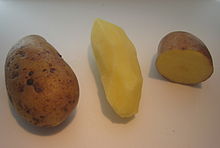Almond potato

The almond potato (Norwegian: Mandelpotet,[1] Swedish: Mandelpotatis,[2] Finnish: puikulaperuna[3]), also called Mandel potato or Swedish peanut fingerling,[4][5][6] is a potato known since the 19th century.[7][8] Almond potatoes are yellow or white; in rare cases a kind called blue almond can be found which is yellow-white with some color changes in blue. Its shape is oval and somewhat resembles an almond, hence the name.
It is considered a delicacy in Norway[9] and in Sweden, where it is most commonly grown in the northern parts.[10] It can be grown better in the north, since the variety is susceptible to plant diseases in the south.[11] Finnish Lapland puikula (Lapin puikula) has a European Union Protected Designation of Origin.[12][13]
References
- ^ Norway. Landbruksdepartementet (1943). Melding om de offentlige tiltak til ophjelp av landbruket: Meldinger fra statens forsøksstasjoner i plantekultur (in Norwegian). Grøndahl & Søns. pp. 60–.
For feltet på Stor-Elvdal kommunegård artet tørr-råteangrepet seg noe liknende, om ikke fullt så galt. Her var Mandelpotet medtatt istedenfor Sagerud, og den ble først og sterkest angrepet. Etter siste kontroll den 15. september stod Arnica og ...
- ^ Meddelande - Statens vaxtskyddsanstalt. 101-107 (in Swedish). 1964. pp. 268–.
Mandelpotatis synes ha funnits i Sverige under lika lang tid som Magnum bonum. Sålunda anfor H. von Post 1889 i en "Studie over Potatisvarieteterna" resultaten av flerariga prov med några sorter, varibland . . .
- ^ János Gulya (2002). Konfrontation und Identifikation: Die finnisch-ugrischen Sprachen und Völker im europäischen Kontext (in German). Harrassowitz. pp. 95–. ISBN 978-3-447-04656-5.
Im Rahmen des Namenschutzes für geographisch gebundene Nahrungsmittel ist die rundovale Kartoffelsorte Lapin puikulaperuna für den finnischen Markt per EU- Gesetz geschützt. Sie gedeiht nur in nördlichen Gegenden von Finnland und ...
- ^ Nærstad, R.; Hermansen, A.; Bjor, T. (2006). "Exploiting host resistance to reduce the use of fungicides to control potato late blight". Plant Pathology. 56 (1): 156–166. doi:10.1111/j.1365-3059.2006.01491.x.
- ^ Sue Stickland (1998). Heirloom Vegetables: A Home Gardener's Guide to Finding and Growing Vegetables from the Past. Fireside Books. pp. 151–. ISBN 978-0-684-83807-6.
Swedish Peanut Fingerling A dry golden-fleshed late season variety, grown by Swedish settlers in about 1900. Crescent shaped potatoes are great baked or roasted, they set and store well, and are ...
- ^ Growing for Market: News and Ideas for Market Gardeners. Fairplain Publications. 2000. pp. 143–.
Swedish Peanut Fingerling also has an interesting history. "This variety was brought to Alaska by Swedish Settlers in 1910-15, and was called Mandelpotatis," related Gerritsen. "I received seed for Swedish Peanut Fingerling from a friend, Bill ...
- ^ Journal of the Royal Horticultural Society. Royal Horticultural Society. 1896. pp. 406–.
- ^ Journal of the Royal Agricultural Society of England. Royal Agricultural Society of England. 1898. pp. 590–.
- ^ "A Taste of Norwegian Fall". Royal Norwegian Embassy in Washington. Retrieved 11 March 2010.
- ^ Kirsten Dreyer (1 January 1994). Kamma Rahbeks Brevveksling Med Chr. Molbech (in Danish). Museum Tusculanum Press. pp. 77–. ISBN 978-87-7289-245-0.
Frem til idag kendes "Mandel potatis" og "Mandel potet" fra dyrkning i dalene i Nordsverige og Nordnorge (venligst oplyst af direktør Karl Tolstrup, Landbrugets Kartoffelfond, Vandel)
- ^ Anton Letnes (1966). Potetboka (in Norwegian). Bøndenes Forlag. pp. 36–.
Mandelpotet er en gammel landsort som dyrkes i de øverste dalfører og nord i landet. Den har en middels høg, sluttet og overhengende risvekst. Stenglene har en sterk svartbrun farge og er gjerne greinet. Bladene er mørkegrønne og middels ...
- ^ Official Journal of the European Communities: Legislation. Office for Official Publications of the European Communities. 1997. pp. 22–.
- ^ Graeme Thomas; Giulio Sansonetti (13 January 2009). New light on a hidden treasure: International Year of the Potato 2008, an end-of-year review. Food and Agriculture Organization of the United Nations. pp. 21–. ISBN 978-92-5-106142-8.

